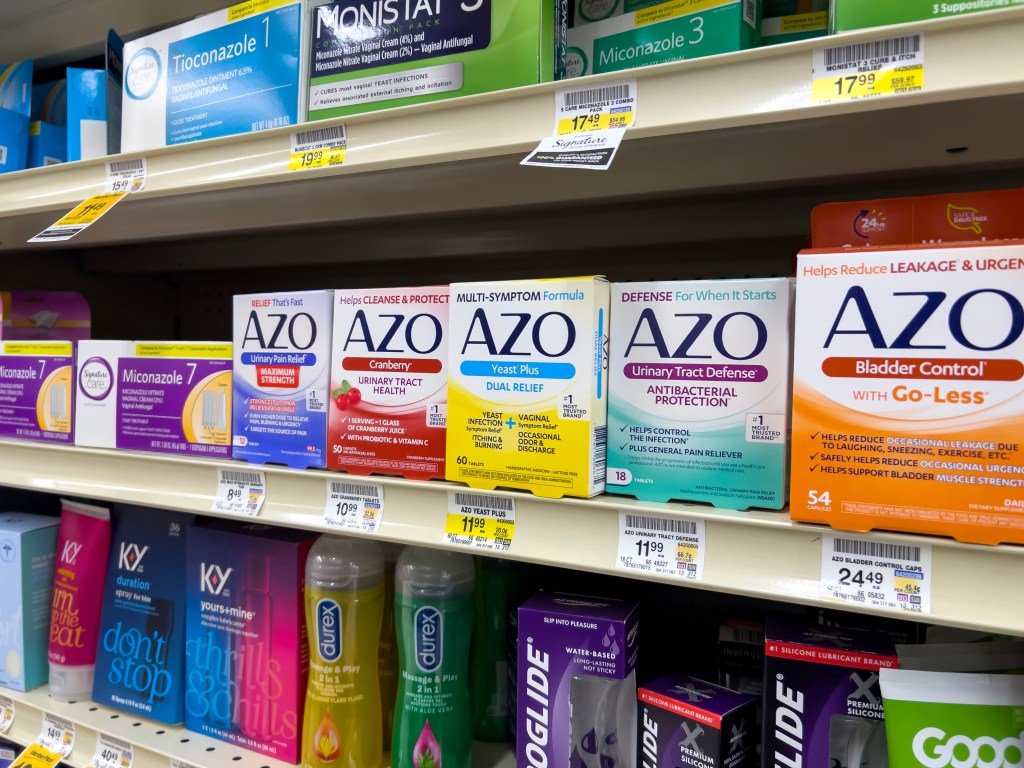Last Updated on July 29, 2023 by Jada Glover
As a new mom, you probably already know that certain drugs and medications are not recommended while you’re breastfeeding. These medications can get into your breast milk and potentially harm your baby.
If you’ve experienced a UTI, short for urinary tract infection, you know how it can translate into a lot of discomfort, and sometimes pain too. And if you’re a nursing mother, dealing with UTI symptoms can be quite a challenge.
Think about it- you’re sleep-deprived, exhausted, nursing on demand, or pumping, and then there’s this throbbing pain down there, with a burning sensation when you pee.
Azo is a popular over-the-counter medication meant to help with urinary tract infections and is recommended by healthcare professionals. But, is Azo Urinary Pain Relief or even Azo Cranberry safe for breastfeeding moms? Let’s see!
Please note that this article contains affiliate links, which means that I may earn a commission if you buy something (at no additional cost to you). Read my full disclosure here. I only recommend products I use and love and recommend to my clients.
How Does Azo Help?
Azo Urinary Pain Relief contains an active ingredient called Phenazopyridine Hydrochloride, which offers symptomatic relief in patients suffering from UTIs. It is actually nothing more than a mild anesthetic that can reduce discomfort and irritation which are common in patients with bladder infections.
Remember that only antibiotic use (or other natural means) can actually help treat a urinary tract infection in its truest sense. Azo Urinary Pain Relief pills simply help you deal with the symptoms of a UTI.
The active ingredient in this belongs to a class of medications that are recommended for pain relief but do not have any impact on bacterial growth, which is the actual cause of a urinary tract infection.
When taken in large doses, Azo Urinary Pain Relief has also been linked to kidney failure.

Just to clarify, there is an Azo Cranberry Urinary Tract Health supplement on the market also which contains cranberry extract and probiotics. It does not contain phenazopyridine. This is likely safe to take to promote urinary tract health, but we always recommend working with your primary care physician before starting any new supplements.
Can I Take Azo While Breastfeeding?
There are very few studies done on possible drug interactions when you take Azo Urinary Pain Relief while breastfeeding or when you’re pregnant.
As a result, Azo is not a drug that falls under the safe category for breastfeeding mothers or pregnant mothers.
The safety of phenazopyridine for a breastfeeding mother and even for pregnant women is quite questionable. Whether or not phenazopyridine is found in breast milk is still not completely understood.
Some mothers have reported changes in their urine color after using this drug.
In certain extreme cases, the use of Azo might also cause your skin to become yellowish in color, which indicates possible kidney failure. At this point, you’ll need immediate medical help.
Why Are Some Drugs Not Recommended While Breastfeeding?
Pregnant and breastfeeding mothers are advised against the consumption of certain drugs and medications by their healthcare provider.
This is simply because these drugs can pass into your baby’s body, and at times, cause severe side effects and allergic reactions to both of you!
Remember that when you’re breastfeeding, everything that you eat is being passed on to your baby. This is why it is best to exercise caution and stay away from self-medicating at any point in time.
Even if you have been taking a certain OTC drug for years, without any side effects, think twice before taking it if you’re breastfeeding.
If you’re experiencing discomfort associated with a UTI or any other health concern while you’re nursing, it is best to seek advice from a healthcare professional, who will offer you safe medication choices.
Here’s a tip for you, if you’re ever unsure about the effects of specific medications while breastfeeding, you can use the LactMed database to look up safety information.
Possible Harmful Effects of Taking Azo While Breastfeeding
There aren’t enough studies done yet to decode the extent of the adverse effects linked to the consumption of Azo. However, there is some anecdotal evidence that points out these potential risks of consuming the drug while you’re nursing.
G6PD Deficiency
If you’re a pregnant or breastfeeding mom with a baby under 6 months of age, taking Azo could put your baby at risk of glucose-6-phosphate dehydrogenase deficiency, which is a blood disorder that affects the oxygen-carrying capacity of the blood in your baby’s body.
Hemolytic Anemia
Hemolytic anemia occurs when the red blood cells in your body start to deplete faster than they can be replaced. This, in turn, causes anemia, reducing the oxygen that your red blood cells carry throughout the body.
Other Possible Blood Disorders
The use of Azo during breastfeeding has also been linked to a blood disorder known as methemoglobinemia, where too much methemoglobin is produced in the body.
This disorder affects how the red blood cells carry oxygen throughout your body and can cause serious problems. This can be life-threatening too.
There’s also a risk of Sulfhemoglobinemia, a condition where the red blood cells in your body become incapable of carrying oxygen.
How Can I Safely Tackle Urinary Tract Infections While Breastfeeding?
Now that you know it isn’t safe to take Azo while breastfeeding, your best course of action would be to seek out advice from a healthcare professional about what your next steps should be.
You could also consider turning to natural remedies and methods to tackle urinary symptoms, as opposed to seeking out Azo for pain relief medications.
D-Mannose
While antibiotics have long been the go-to treatment option, there is growing interest in natural remedies such as D-mannose.
It is a naturally occurring sugar found in various fruits and vegetables.
D-Mannose is a supplement that can be taken by a pregnant or breastfeeding mom to help maintain good urinary tract health. It is intended to be a preventive measure or a reactive measure.
It prevents bacteria from adhering to the urinary tract walls by acting as a decoy molecule.
You can find D-Mannose at your local health food store or at online retailers like Amazon.
I took this same one when I was pregnant with my daughter. Although I wasn’t having any UTI symptoms, my urine test was showing a UTI. My midwife suggested it as a preventive measure and to support good urinary tract health.
Cranberry Juice
Cranberry juice and cranberry supplements are most commonly recommended for individuals showing signs of a UTI. They are also among the oldest known home remedies to tackle bacterial infections in the lower part of your urinary tract.
As opposed to general pain relievers, cranberry extracts work by flushing the harmful cells that attach themselves to the walls of your urinary tract. Plus, they are also a great source of antioxidants.
Just remember to use organic, unprocessed, and unsweetened versions of cranberry juice for best results.
Cranberry extract can also be effective in supporting good urinary tract health.
Hydration
One of the simplest ways to tackle a UTI is to drink plenty of water and keep yourself hydrated throughout the day. When you drink plenty of liquids, the bacteria in your urinary tract pass out through urine. Remember not to hold the urine in too long, and visit the bathroom whenever you feel the urge to.
Stick to just plain water, fresh fruit juices, or coconut water. This one’s a great tip for breastfeeding moms in particular because it also helps boost milk supply!
Make sure you cut down on your consumption of sugar or processed foods, which are known to aggravate the infection.
Good Personal Hygiene
Another simple way to tackle UTI infections and prevent them is to maintain good personal hygiene. Remember to wear clean, breathable underwear that fits you just right, and isn’t too tight.
When cleaning yourself after using the loo, make sure you wipe from front to back, especially if you’re someone who suffers from frequent UTIs.
This way, you’ll also be at a lower risk of suffering from future infections.
When to Seek Medical Help For a UTI While Breastfeeding
Remember that if you are suffering from extreme pain and discomfort, or have a high fever, you may need to seek professional medical advice immediately. Your doctor might suggest some urine tests to determine the severity of the infection, and then proceed to offer you medical treatment specifically based on what you need.
Severe infections may require a course of antibiotics, and your healthcare practitioner might also advise you to drink lots of fluids and take rest, especially if you’re dealing with it while you’re breastfeeding. You’ll then need to follow this up with some probiotics to restore the population of good bacteria in your gut.
Are Azo Pills Safe To Take While Breastfeeding?
You might have come across Azo cranberry pills and a lot of other supplements which pack in cranberry extracts. These are supposed to be really helpful in tackling urinary tract infections. They might even have really good reviews.
While cranberry as a single food, by itself is not harmful, the other ingredients could be potentially harmful to you and your baby. For this reason, Azo Urinary Pain Relief is not safe to take for urinary pain relief while breastfeeding.
Eat a healthy diet full of prebiotics and probiotics, practice good hygiene, add some cranberry juice to your day, and stay hydrated to ward off UTIs naturally.
Other posts you might be interested in related to breastfeeding and postpartum health:



 How Fast Do Lactation Cookies Work For Breastfeeding Moms?
How Fast Do Lactation Cookies Work For Breastfeeding Moms?